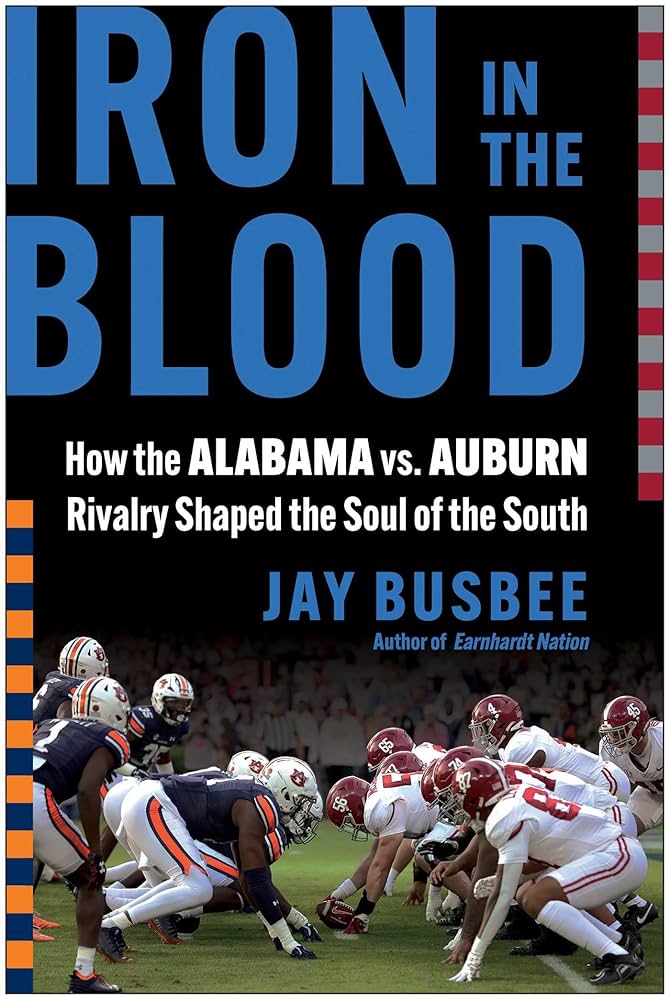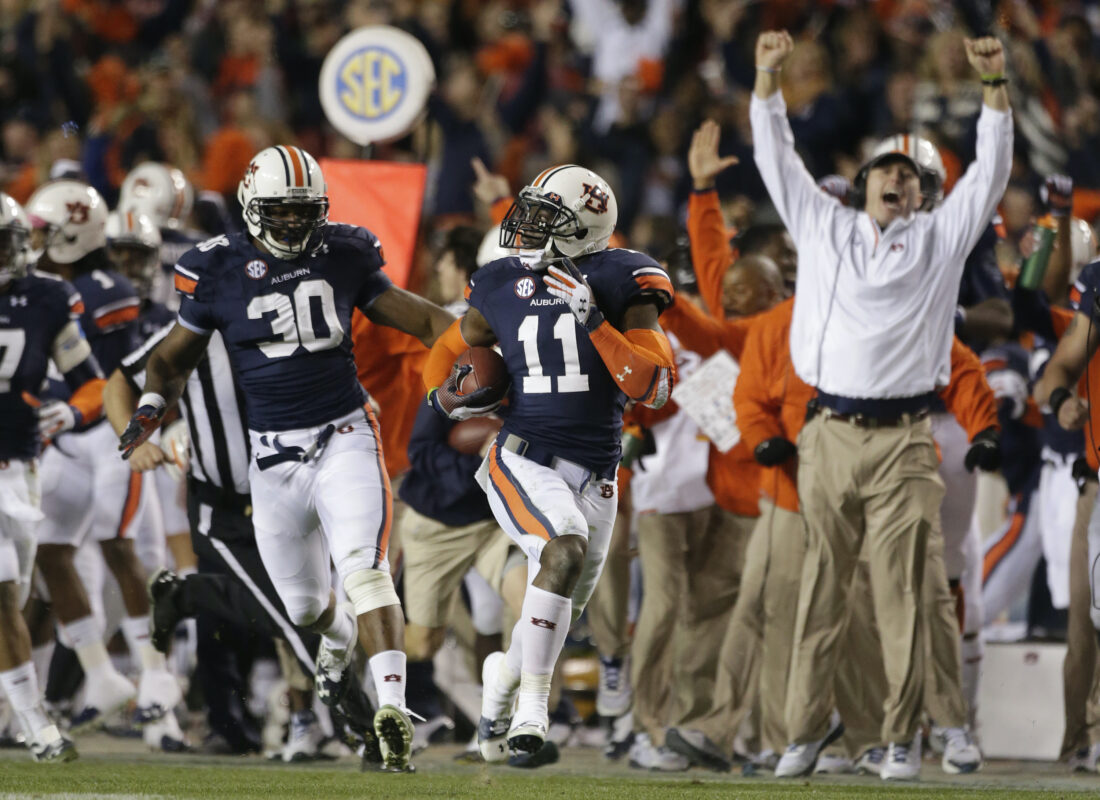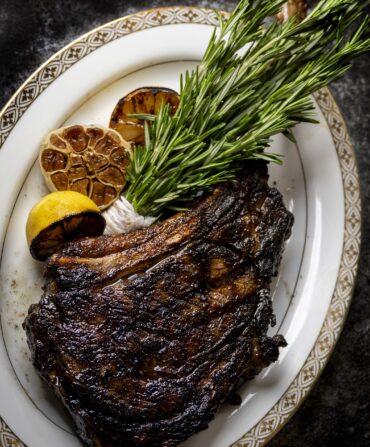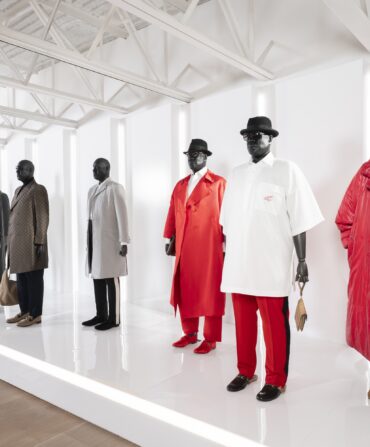
The following passage is excerpted from Jay Busbee’s new book, “Iron in the Blood: How the Alabama vs. Auburn Rivalry Shaped the Soul of the South,” out today from Matt Holt Books and distributed by Simon & Schuster. Busbee’s book brings to life more than a century of lore, including the first Iron Bowl in 1893, the making of legends like Bear Bryant and Pat Sullivan, the game that inspired the integration of Southern college football, the tragedy of the Toomer’s oaks, and the mother of all instant classics, the Kick Six.
There’s no other way to put it: the 2013 Iron Bowl is the greatest game Auburn and Alabama ever played, and it’s in the running for the greatest games in sports history too. The stakes, the weight, the implication, the finish…everything combines to make this game one of the most memorable ever played in America.
Consider: Auburn at last won the ultimate reward for its century-plus of suffering relentless jabs, insults, condescension, and dismissal at the hands of its cross-state rival. Alabama finally discovered the price it had to pay for all those decades of success. No matter how many more rings Alabama gets than Auburn, no matter how many dynasties the Tide stack on top of each other, Auburn fans will always be able to pierce their armor with two. Little. Words.

The Gene Chizik era at Auburn had ended quickly and unceremoniously. The Tigers went a combined 3–17 in SEC play in Chizik’s final two years, and that was enough to convince the power merchants in Auburn that a change was necessary. So Auburn reached out to Gus Malzahn—whom many not-so-privately suggested had been the true driving force behind Auburn’s national championship—and the former offensive coordinator came back to The Plains to start the 2013 season. A bespectacled onetime high school coach, Malzahn set about installing an aggressive, wide-open offense that specialized in piling up points in a hurry. It was exactly the injection of spirit the program needed, and it was about to pay off faster than even the most fervent Auburn acolytes could have imagined.
Malzahn immediately led the Tigers to a 9–1 record heading into the season’s final games, a run that had included last-second wins over both Mississippi State and Texas A&M. But that was merely the tiniest appetizer before the feast that was to come.
First, there was the latest installment in the South’s Oldest Rivalry. Auburn was down 38–37 to Georgia, facing fourth and 18 with 36 seconds remaining in the game. Quarterback Nick Marshall heaved the ball downfield, where it tipped off the hands of two Georgia defenders and right into the arms of Ricardo Louis, who scooted away for a miraculous 73-yard touchdown that kept Auburn’s national championship hopes alive.
That was the Prayer at Jordan-Hare. For any other program, it would have been the most famous play in the school’s history. For Auburn, it wouldn’t even be the most famous play of the month.
Perhaps the strangest element of Nick Saban’s Alabama tenure was that many of the most memorable games of his time in Tuscaloosa are the ones he lost, because they came so rarely and required such a confluence of skill, luck, and random weirdness. Any victory over Nick Saban deserved a celebration, but a victory with national championship implications deserved its own holiday.
Alabama arrived in Auburn on the afternoon of November 30, 2013, as a colossus, the two-time defending national champion and No. 1–ranked team in the country, winner of all 11 games so far that season. Auburn, meanwhile, lurked at No. 4. The Tide was the 10-point favorite, but the Tigers were still carrying fresh memories of the Prayer at Jordan-Hare and a belief that no game was over until the clock read 0:00. Advantage: neither.
“I’ve been to a number of Iron Bowls, and you can feel it in the air, that tension,” says journalist Dan Wetzel. “Even when you’re good, you’re worried about losing. Especially when the game’s in Auburn. You’ve got to have that healthy respect of, ‘We could lose, and this could be horrible.’ So before the game, it’s not festive. It’s tense. There’s a palpable fear of what could go wrong.”
This game marked only the second time that both teams came into the Iron Bowl ranked in the top 5, and this particular combination was the highest-ranked pair ever. The winner would head to the SEC championship game and have a clear path to the national championship game.
So there was no need to hype this game, but everyone involved did it anyway. Auburn had begun the season unranked and had won its way into contention thanks to those exceptionally lucky and timely victories. As a result, few gave the Tigers and Malzahn much of a chance against Saban. College GameDay posted up on campus at Auburn, and every single one of the regular panelists picked Alabama to win. The only dissenter? Guest picker Charles Barkley, who went with his beloved alma mater.
With tension at a fever pitch, the game began, and Alabama got off to its customary slow start. The Tide under Saban tended to spend the first quarter sizing up its adversaries, testing their strengths and searching out weaknesses. That could lead to opponents getting early scores, and even leads, against Alabama—which all too often proved to be false hope.
In this case, Auburn’s Marshall put the Tigers up 7–0 with a 45-yard touchdown run midway through the first quarter. And then the Tide began to rise. A. J. McCarron fired off two quick touchdown passes and led a third scoring drive to put Alabama up 21–7. A late Auburn touchdown by Tre Mason pulled the Tigers back to within seven at halftime.
Normally, the game would be over. Alabama to that point had a 73–3 record under Saban when leading at the half. But the Iron Bowl has a way of obliterating statistics and upending narratives.
One element forgotten in all the chaos that was to come: McCarron put the Tide ahead 28–21 with a 99-yard touchdown pass, the longest in Alabama history. Had things worked out differently, that would’ve been the story of the 2013 Iron Bowl. Instead, it’s barely a footnote.
One element very much not forgotten: Alabama kicker Cade Foster missed three field goals over the course of the game. Kickers and Nick Saban had an uncomfortable, even hostile, relationship, and on this night, the relationship turned toxic.
Late in the game, facing fourth and one on the Auburn 13, Saban elected to go for the first down rather than attempt a short field goal. Up 28–21, a touchdown would have salted away the game for Alabama, but T. J. Yeldon was stopped at the line by Carl Lawson, a freshman defensive end. A few minutes later, faced with the same situation at the Auburn 25, Saban opted to go for the field goal—which was promptly blocked for Foster’s third miss of the game. Up until that point, he had missed only one field goal all season.
Then came 32 seconds that will live in Auburn memory as long as that little school on The Plains exists. Marshall spotted Sammie Coates open, hitting him for a 39-yard touchdown to tie the game at 28. Alabama pounded its way down to Auburn’s 38-yard line, but defensive back Chris Davis knocked Yeldon out of bounds as time expired. Overtime awaited.
Or did it? Saban argued that one second remained when Yeldon went out of bounds, and appealed to the officials. A replay upheld Saban’s challenge, putting a second back on the clock.
On the sideline, McCarron loosened up, apparently thinking there would be a Hail Mary. On the CBS broadcast, Verne Lundquist and Gary Danielson thought the same thing.
But Saban opted to go with freshman kicker Adam Griffith instead of Foster. Auburn called a timeout to give Griffith time to think about the most important kick of his life. Auburn defensive coordinator Ellis Johnson, observing the Alabama formation, suggested putting Davis, a quicksilver punt returner, in the back of the end zone, just in case. Malzahn switched out safety Ryan Smith for Davis, Auburn’s regular punt returner.
The field goal attempt sailed into the night, and fell right into Davis’s hands. Standing on the E in TIGERS, his heels almost out of bounds, Davis caught the ball and raced up the left sideline, outrunning every single one of Alabama’s beefy linemen. A long kick requires a low trajectory, and a low trajectory means that more linemen have to hold off a charging defensive line, and more linemen means fewer speedy players on the field to catch a phenomenally unlikely—but still possible—return.
Auburn radio commentator Rod Bramblett’s call of the final play is so perfect, it’s worth recalling in full:
“Chris Davis is going to drop back into the end zone in single safety. Well, I guess if this thing comes up short, he can field it and run it out. All right, here we go. 56-yarder, it’s got—no, it does not have the legs. And Chris Davis takes it in the back of the end zone. He’ll run it out to the 10, 15, 20, 25, 30, 35, 40, 45, 50, 45—there goes Davis!”
“Oh my God! Oh my God!” shouts booth partner Stan White.
“Davis is going to run it all the way back! Auburn’s gonna win the football game! AUBURN’S GONNA WIN THE FOOTBALL GAME! He ran the missed field goal back! He ran it back 109 yards!”
The fans began streaming onto the field, and Bramblett exulted.
“They’re not gonna keep them off the field tonight! Holy cow! Oh, my God! Auburn wins! Auburn has won the Iron Bowl! Auburn has won the Iron Bowl in the most unbelievable fashion you will ever see! I cannot believe it! 34–28! And we thought ‘A Miracle in Jordan–Hare’ was amazing! Oh, my Lord in Heaven! Chris Davis just ran it 109 yards and Auburn is going to the [SEC] championship game!”
Fans leaped from the stands into the bushes that ring the sidelines. They stayed on the field for an hour, running Davis’s route, cutting pieces of the field or twigs from the bushes for souvenirs. Elsewhere on campus, students threw toilet paper rolls over wires installed for just that purpose as the new oaks awaited transplant on Toomer’s Corner.
Kick Six was literally a play without precedent. In the history of FBS-level college football, a missed field goal had been returned for a touchdown only four times, and never in a walk-off.
“Auburn picked up a lot of accidental War Eagle fans during the Saban era, because Auburn was the last line of defense,” ESPN’s Ryan McGee notes. “If you’re going to keep Alabama out of Atlanta [for the SEC championship] or out of the college football playoff, you felt a nation pulling for Auburn because everyone wanted someone different to be playing for a national championship. Everybody just got sick of hearing about Alabama, and sick of hearing about Saban.”
The stunning Kick Six facts abounded. According to ESPN, Auburn had now won three games in which its win probability was less than 10%. At the end of the game, 82% of the televisions in Birmingham were tuned in to the Iron Bowl. And Davis got a standing ovation from his classmates when he walked into his Monday morning geology class.
“This is going down in history,” Davis said after the game. “This is one of the moments I’ll tell my son about.”
“That was not,” Saban allowed afterward, “a great way to lose the game.”
Barkley, still in town after his GameDay stint, threw down $1,000 to buy a round of drinks at nearby Hamilton’s. “It was a payback moment for poisoning our damn trees,” he said, “and man, it was sweet. One of the great moments in my life.”
“War Eagle,” Cam Newton crowed as he opened his postgame press conference after the Panthers beat the Buccaneers the next day. “War Eagle. War Damn Eagle!”
A seismometer in Huntsville measuring the movement of the Earth in the state of Alabama registered an intriguing seismic signature beginning at 6:25 PM—the exact moment of Kick Six.
The Tigers would go on to knock off Missouri in the SEC championship, and when No. 2 Ohio State lost to Michigan State in the Big Ten championship, Auburn was suddenly back in its second national championship game in four years. That title game didn’t work out quite so well; Florida State and Jameis Winston outran Auburn 34–31 to at last defeat the Cardiac Tigers of 2013 in the final minute.
Still, Auburn will always have Kick Six. It’s in the conversation for the greatest sports play of all time, in any sport. If nothing else, it will endure as long as the Auburn–Alabama rivalry does, a symbol that no game is ever lost—or won—if time remains on the clock.








